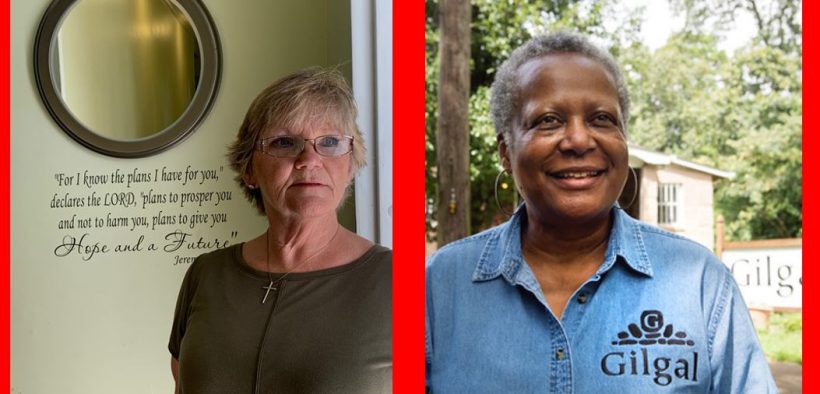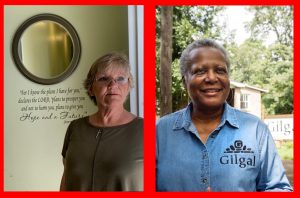A Path to Hope
Nonprofit recovery program, Gilgal, provides a fresh start for more than 760 women in Atlanta

When Sara Fox came to Gilgal, a nonprofit recovery program in Atlanta, Georgia, she had visited every women’s prison in the state of Georgia. A judge had recently banned her from returning to a specific Georgia county, labeling her, “a menace to society.” She had been addicted to drugs for 43 of her 59 years and supported her lifestyle through criminal activity.
“At 17, I went to prison for the first time. My life turned to a wreck. When I ended up at Gilgal, I didn’t believe I was valuable in any way,” Fox said, who came to Gilgal in 2017, her face battered from a recent fall. “I wanted to hope but didn’t believe there was hope for me.”

Fox was accepted into the year-long Gilgal resident program and started two weeks before Christmas. While Fox said she put her head down and did what she had to do to meet the program’s standards, she didn’t trust anyone. That’s when she was met with the consistent devotion of Val Cater, founder and executive director of Gilgal, and the rest of the team.
“I have learned so much compassion,” said Cater, who sits down with each client to hear their life story. “It is important to take clients from that place and look forward. The women who come are no different than you and me. They just made choices we didn’t make. I want them to know God loves them.”
With more than four decades as an addict, Fox said she had a lot of deep but wrong perceptions of the world. This included the belief that her father’s actions mirrored God’s perspective of her. She thought of God as judgmental and critical, punishing and angry, someone who had handed her what she called “a dirty deal.” Fox said the empathy she received from Cater pointed her to what truly changed her: the raw love of God.
Access to MinistryWatch content is free. However, we hope you will support our work with your prayers and financial gifts. To make a donation, click here.
“I projected onto God the character of my father who had battered me my whole life. I found out I was wrong. I found through the continual influx of love from the staff and opening of the truth of the word of God day after day,” Fox said. “I finally met the God of the Bible and he became more of a Savior to me. He became a God I could trust.”
Not only did Gilgal lead to total internal life change, but it prepared Fox with a sustainable lifestyle. Since the launching of Gilgal in 2005, more than 760 women have been served by Gilgal. Women who graduate the program have at least one year clean, a job that pays living wages, and affordable housing, Cater said.
Gilgal, which WORLD featured in its 2020 Hope Awards, teaches health and wellness, including how to keep tabs on medical records, find and go to the doctor, keep track of medications, as well as healthy eating and cooking. Business students teach Gilgal clients classes on resumes and how to budget. Pastors teach Bible classes and lead discussions on topics of faith. Job fairs (pre-COVID-19) held on Gilgal’s property allow for in-person interviews and job searching, as well as personable follow-up for landing jobs. The clients are also taught family reunification classes by local social workers, helping them to navigate complex family situations.
Fox completed Gilgal’s program, got a full-time job at Chick-fil-A, and graduated with enough money saved to rent her own apartment. Immediately, she started donating her time to teach classes at Gilgal.
“I have watched God do the miraculous in people’s lives, and women who thought they would never see their children or families again or ever get a job,” Cater said, smiling. “It is an exciting thing to see their futures change. I have gone to weddings of graduates and watched a mom get back together with her children. Watching God be glorious in their lives is amazing.”
Cater said she was the last person you would expect to launch Gilgal. A math major from the University of Alabama who ran her own IT business for 11 years, Cater was involved in her church but says she was a busy mom and “a pew sitter.” Cater’s husband, Tommy, who works in real estate, found the beautiful house in 2004 that now houses Gilgal.
“He said, “Val, there is something about this house! You should consider doing something here for women,’” Cater said. Tommy wouldn’t let up on the idea. “My life was full of soccer games and play dates and all the things that go with a 7 and 9-year-old youngster. I also ran my own business so it wasn’t appealing to me,” she added. Then, she said she prayed: “Lord I will do anything you want me to do, and I know you can speak through Tommy, but I need a neon light.”
And she says God gave her those lights, one of which was a grant from the United Way. In 2004, she bought the house, sold her company, and in early 2005 launched Gilgal.
The wide open doors were quickly met with needy women, Cater said. Gilgal can currently host 25 women at a time at max capacity. Yearly, it serves between 48 and 51 women. The median age is 41, though it is starting to trend younger. Grants in 2008 allowed Gilgal to expand, allowing them to purchase a nearby doctor’s office and church building for offices, additional housing for women, and classrooms for client education.
Cater said one of her biggest jobs has been creating a system with her team to pull back the covers, so-to-speak, on anything outstanding legally on their clients—letters, fines, and other outstanding debts. “We say, “Hey, if there is anything out there, we want to deal with it and never have you look behind your back as you leave here.’”
Breaking the myth of who these women are for her community at large has been a rewarding experience, Cater said.
Out of caution, last March Gilgal closed its doors to new clients due to COVID-19. All enrolled clients stayed and continued the program, with all classes going virtual instead of having on-site instruction. Currently, Cater said, they’re in discussion for what it would look like to open back up with social distancing measures in place. The community has generously donated PPE, but due to COVID donations for Gilgal are down.
Looking into 2021, Cater said she dreams of expanding on the property to allow for early intervention with needy women through modular housing. Currently, when women call needing help, a firm requirement is 72-hours sober. For those currently in recovery, having former addicts smelling someone who used a few hours ago, senses are raised, creating complex situations. But this guideline causes Gilgal to lose women they desire to help, Cater said.
“With the modular housing, we would have a place you could spend those 72 hours,” Cater said. “The woman can quarantine and then be introduced into our community. This is our dream for 2021.” Gilgal is in the fundraising process, currently, and hopes to break ground this year.
Some Gilgal graduates come back to work on staff, Cater said, including Fox. After a year of donating her time in the evenings and working a full time job at Chick-fil-A, Fox was hired as a Residential Manager at Gilgal. Fox says she loves her job, where she can give a combination of experience and empathy, equal doses of what she needs to lead through the complex stories at Gilgal. Her goal is to exemplify the love she experienced.
“The staff so mimicked the character of God to me. They didn’t wait for me to be civil or cleaned up or good. They took me as I was,” Fox said. “The world has a lot of answers and a lot of programs and a lot of quick fixes and diagnosis and a lot of syndromes. Whatever the question is, Jesus is the answer. You can walk in victory with Christ regardless of your circumstances, and that is the best news I ever have heard in my life.”



